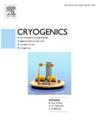A design study on 20 kW class axial flux motor with HTS field winding for 100 MPa liquid hydrogen pump
Abstract
This paper presents a design study of a low-speed, high torque 20 kW class motor with a high-temperature superconductor (HTS) field coil for a liquid hydrogen centrifugal pump. The motor is designed based on three key concepts: 1) employing an axial-flux motor topology that can increase torque density by reducing the axial length together with a centrifugal pump; 2) using liquid hydrogen in a pump as a coolant for HTS coil; 3) adopting no-insulation (NI) YBCO solenoid coils as field coils of the motor to improve coil protection as well as mechanical stability. In the design process, first, an electromagnetic design of the axial type motor is obtained considering the required performance of previous commercial pumps. Considering the current and temperature margin to secure the HTS coils' stable operation, two types of HTS coils (solenoid type and triangle type) are designed and their performances are compared. Second, to evaluate validity of the electromagnetic designs, mechanical stresses in the HTS coils are estimated. By comparing the solenoid type and the triangle type, it is confirmed that the solenoid type has a distinct stress-reducing effect in terms of magnetic stress as well as rotational stress. Our design study results show the potential superior performance of the axial flux motor with HTS coils for several tens of kW applications with low speed and high torque loads such as liquid hydrogen pumps.

 求助内容:
求助内容: 应助结果提醒方式:
应助结果提醒方式:


